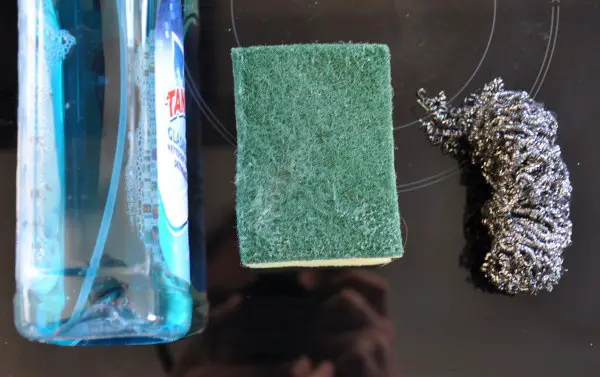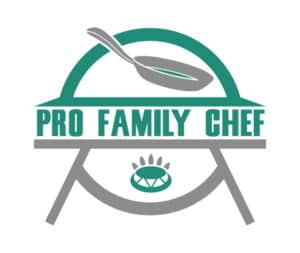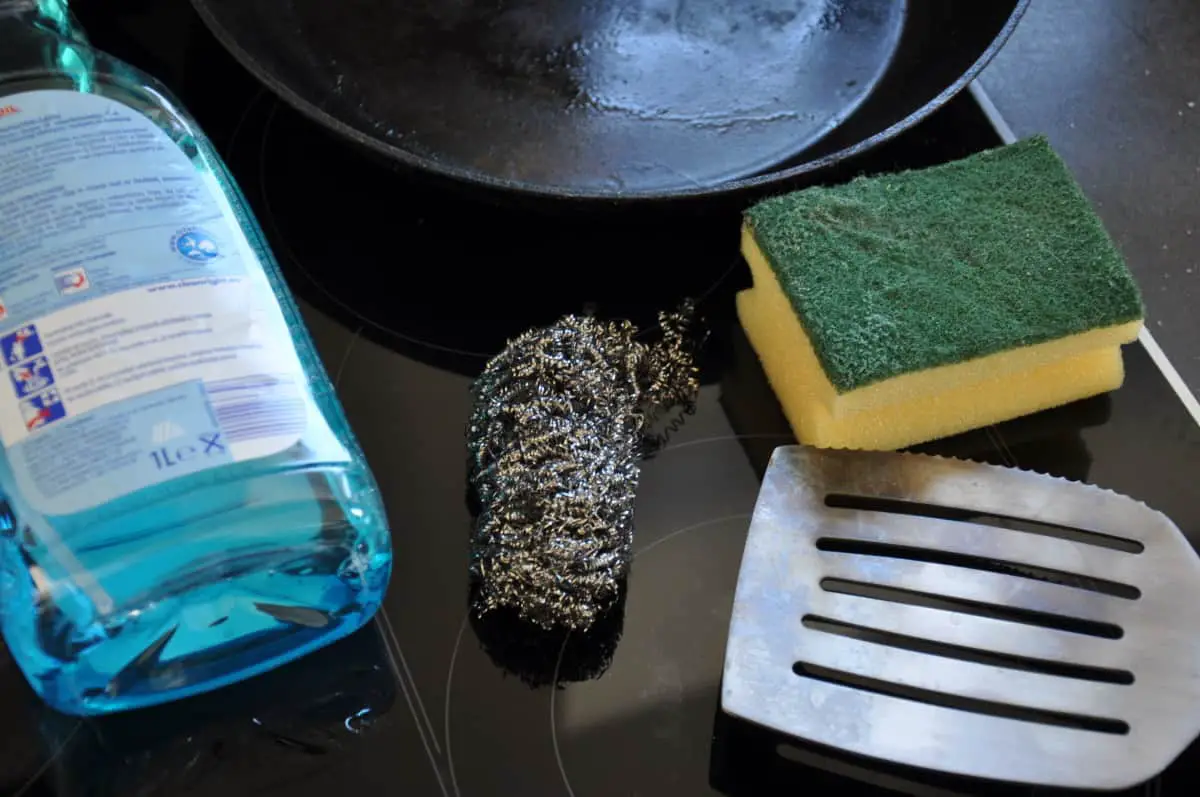If you’re new to the world of induction cooktops, you’re probably wondering: Can you ruin an induction cooktop? These surfaces aren’t as strong as metal cooktops and are surprisingly easy to scratch, crack, and break. Worst of all, a damaged induction surface can’t be fixed and needs to be completely replaced.
So, what shouldn’t you use on an induction cooktop:
You should never use anything on your induction cooktop that is sharp, abrasive, or heavier than your cooktop can support. This includes:
- Old or dull scraping blades
- Cast iron skillets with a rough bottom
- Salt
- Sugar
- Scouring pads
- Alkali based glass cleaners
- Burned food
- Anything heavier than 50lb (22kg) = 24 quart stock pot
- Aluminum
- Groceries
- Windex
- Stonewear
- Glass
- Anything with pointed edges
- Pots and pans with abresive surface
- Knife or fork
- Rolling pin
Let’s take a closer look at what you should avoid using on an induction cooktop.
Also looking for how to protect or cover your induction cooktop? Click here for my post on how to cover and protect induction cooktop!
What not to use on induction cooktop (hob)
The surface of your induction cooktop is very strong, but it can become scratched and break over time if used too roughly. You should avoid using anything that is too heavy, too abrasive, or could cause the surface to crack. This includes cast-iron, sharp metal, and even pots that can get too heavy when full.
Materials that damage induction cooktops
There are plenty of materials that just don’t work on induction cooktops like aluminum, glass, and stoneware. However, materials like cast-iron, which technically work on induction cooktops, can also do a lot of damage to the surface if you use them for cooking. You should avoid using any materials that are rough and could easily scratch or chip the surface. So if you ask yourself are induction cooktops easily damaged, the answer is definitely yes!
This also includes anything you might want to set on top of the induction cooktop temporarily. It’s common to set something on top of your stove while cooking, but you should think twice before throwing that heavy cast iron pot on top of a delicate induction cooktop.
How much weight can induction cooktops handle?
The amount of weight that your induction cooktop can handle is going to change from manufacturer to manufacturer. However, induction cooktops have a general weight limit of around 50 pounds (22,6kg). A large, 24 quart (22,7l) stock pot can weigh upwards of 50 pounds (22,6kg) when it’s full of water, stock, and food.
Your induction cooktop can’t handle the same kind of weight as a traditional gas cooktop. You’re going to want to cook in smaller batches and keep the way in mind so you don’t accidentally crack or shatter the glass composite surface.
Size, shape, and build of cookware that can damage induction cooktops
It’s good to keep in mind that your induction cooktop is made out of a glass composite. This means that anything that’s too bulky, has pointed edges, or has a rough surface can scratch and damage the cooktop surface. This means you should avoid anything that is bulky, has an abrasive surface, or has sharp corners that can crack the surface of an induction cooktop.
What damages an induction hob
Induction cooktops can be easily damaged by using the wrong cookware, cleaning supplies, or even not keeping them clean enough during cooking. These surfaces can be quickly scratched by sugar or salt that gets ground up between the induction cooktop surface and your pots and pans.
When you cook pasta, vegetables, eggs, or anything on your induction cooktop, spilling may occur, or ingredients can fall on the induction plate when adding them to pots and pans. All these things can burn and stick onto the induction plate, and if you slide pots or pans on burned food, scratches occur. This is why sliding pots and pans on an induction cooktop is not recommended.
You should also avoid doing any prep work on your induction cooktop. Great cooking starts with a great mise en place, but you want to avoid cutting, chopping, or doing any rough work on the sensitive induction cooktop surface.
It’s also a good idea to avoid storing anything on an induction cooktop. This includes cutting boards, groceries, or anything else that you might temporarily throw on another cooktop. When it comes to keeping your induction cooktop damage-free, you want to treat these a little bit more gently than you would other cooktop surfaces.
Cleaning and other potential hazards for your induction cooktop
It’s not just cooking that can prove a hazard to your induction cooktop. The tools and cleaning solutions you use to keep the surface nice and fresh can also scratch and chip away at the glass ceramic composite that makes up this cooktop. These are a few of the tools and cleaning supplies that you should avoid when working with an induction cooktop.
Cooking tools that damage induction cooktops
Induction cooktops are made out of tough stuff, but are not as strong as metal surfaces. This means that they can be damaged by any cooking tools that are made out of metal like a chef’s knife or even a fork.
They can also get scratched up by some cooking tools that might surprise you. Your rolling pin could even be enough to do some serious damage to your induction cooktop overtime. We recommend avoiding using any kind of cooking tools on your induction cooktop just to err on the side of caution.
Cleaning tools that damage induction cooktops

You should never use steel wool, harsh cleaners, or scouring pads when cleaning the surface of your induction cooktop. These cleaning implements can scratch up the surface on their own, but they can also grind up dried food and scratch the induction cooktop even more.
Cleaning solutions that aren’t specifically designed for induction cooktops could also eat at the glass and the ceramic that your cooktop is made out of. Windex and other common glass cleaners also can’t be used on induction cooktops even though these surfaces are made out of a glass composite. Common household glass cleaners contain alkali chemicals that can damage induction cooktops.
Conclusion
Induction cooktops are great for cooking, but they do require a different approach when it comes to keeping them damaged free. Remember to avoid anything that’s too heavy or too abrasive and your induction cooktop should last you for years.
More induction cooktop tips and tricks:
–What do you put under an induction cooktop
–How can i protect my induction or glass stovetop
–Best induction cooktop with downdraft
Cooking on induction cooktop
–How to cook eggs on induction cooktop
–How to cook vegetables on induction cooktop

